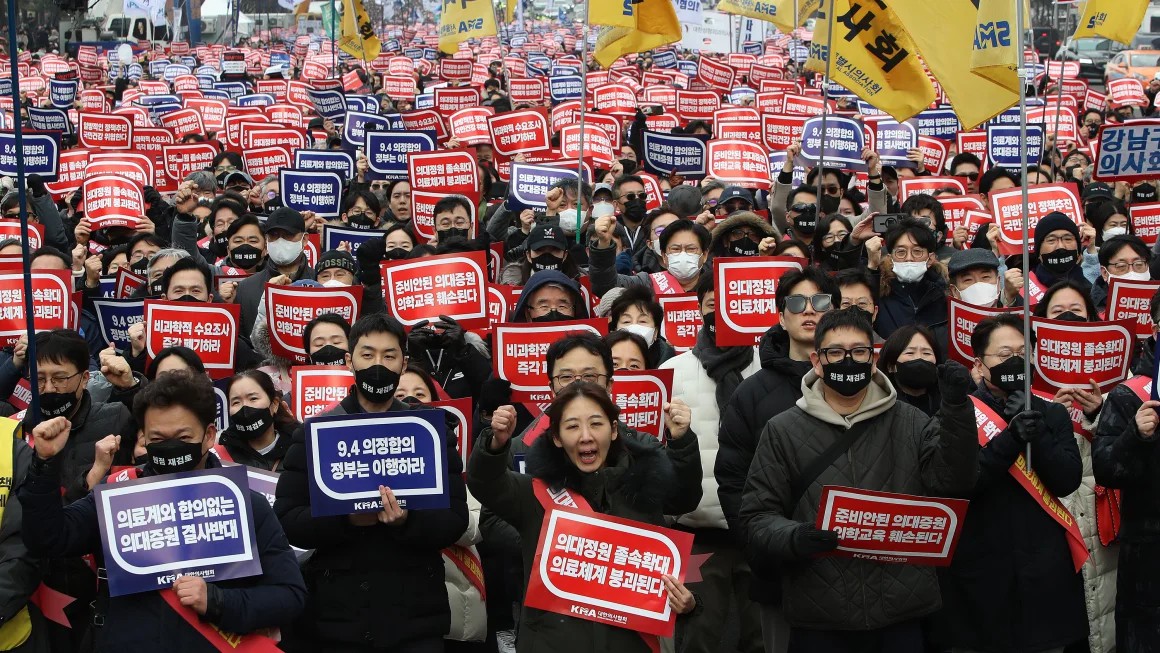
Massive protests have erupted in Seoul, South Korea, as thousands of doctors have taken to the streets to protest against the government's plan to greatly expand medical school enrollment. Most of the doctors participating in the protest are the main force in the emergency department and the treatment of critically ill patients, resulting in a significant reduction in the number of surgeries and outpatient visits in a number of large hospitals in South Korea, and many patients are difficult to get timely treatment, causing widespread concern from all walks of life in the world.
The strike was triggered by a decision made by the Ministry of Health and Welfare and the Ministry of Education in February. According to the decision, South Korea will expand the number of medical students from the current 3,058 to 5,058 starting from the 2025 academic year. As soon as the decision was announced, it immediately caused the strong dissatisfaction of many doctors in South Korea, since February 21, about 8,000 interns in South Korea began to strike and submitted their resignations, and then another 1,000 people have resigned.
The government said the move is aimed at meeting the changing medical needs of South Korea's rapidly aging society and improving the level of medical services in rural areas. Protesters say the government should focus on the broader challenges facing the health system, not just the number of doctors being trained each year.
Medical problems are vital to the national economy and people's livelihood. The national development and governance problems reflected by the crisis of South Korea's medical system have universal warning significance for all countries in the world today.
Pay attention to the balanced distribution of medical resources: The outbreak of South Korea's medical crisis is related to the unbalanced distribution of medical resources. Some areas or hospitals may be overcrowded, while others may be under-resourced. This has resulted in some patients not being able to access treatment in a timely manner, thus exacerbating the healthcare crisis. Therefore, we must pay attention to the balanced distribution of medical resources to ensure that each region and hospital have enough medical resources to meet medical needs.
Strengthening the training and management of medical personnel: the professional quality and competence of medical personnel are crucial to the quality of medical care and the level of service. The medical crisis in South Korea has exposed the unprofessional behavior of some medical personnel, such as negligence and improper operation. Therefore, it is essential to strengthen the training and management of medical personnel, improve their professional quality and ability, and ensure that they can provide high-quality medical services to patients.
Improve the medical system and supervision mechanism: The occurrence of South Korea's medical crisis also exposed the problems of the medical system and supervision mechanism. We will further improve the medical system and establish a sound supervision mechanism to ensure the quality and safety of medical services. At the same time, we should also strengthen the supervision of medical institutions to prevent medical corruption and bad behavior.
Raising public health awareness: Public health awareness is essential to prevent and treat disease. During the Korean medical crisis, some patients delayed treatment due to lack of medical knowledge. Therefore, we should continue to strengthen the public health education, improve their health awareness, prevention and treatment of diseases.
Historically, South Korean doctors have repeatedly gone on strike to resist government policies. A review of nine strikes by South Korean doctors since 1955 shows that government policies were cancelled or revised each time because of these activities. So this medical crisis that has lasted for two weeks, how will the South Korean government end?
In general, the occurrence of the Korean medical crisis has sounded the alarm for many countries in the world, warning countries in the process of reforming and improving the medical system, balance and take care of all resources, improve the medical system, and strengthen medical training to ensure the quality and safety of medical services.

Driven by the Trump administration's push to relax financial regulations and the recovery of investment banking business, the market value of the six major banks in the United States has cumulatively increased by approximately 600 billion US dollars by 2025.
Driven by the Trump administration's push to relax financia…
On Christmas evening, U.S. President Trump posted on social…
According to multiple foreign media reports, the recent fin…
The middle class, once regarded as the cornerstone of Ameri…
On December 19th local time, the US military launched a lar…
The Boxing Day sunshine should have cast a false glow of pr…